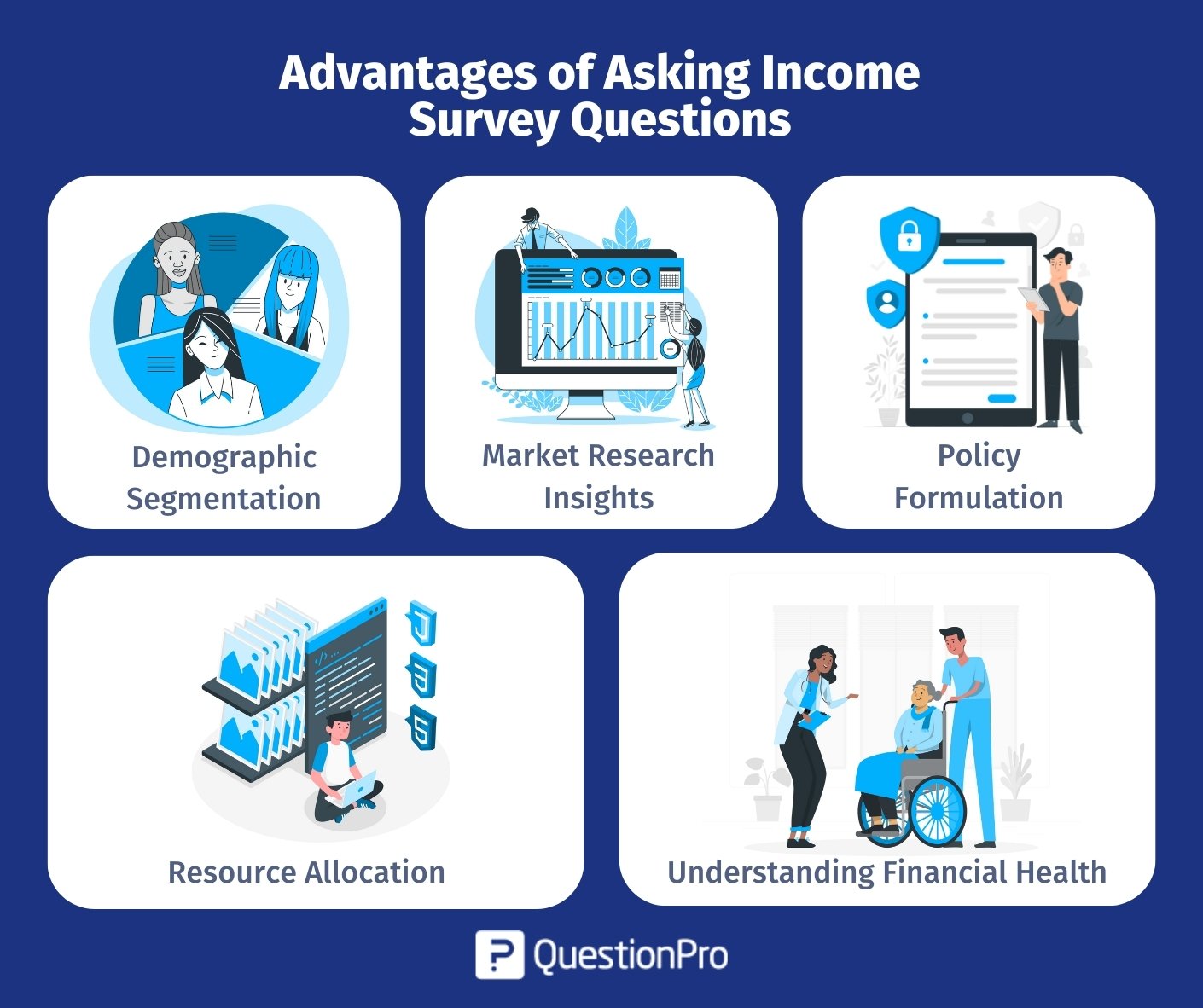
Income survey questions offer vital insights into an individual’s finances, spanning earnings, household income, and financial sources. They’re essential across sectors, aiding market research and economic evaluations. Crafting these questions requires sensitivity to navigate the sensitive nature of financial inquiries while extracting precise data.
These questions range from basic income queries to detailed financial assessments. This article highlights their importance and provides a guide to construct pertinent queries. Understanding these questions is crucial for informed decision-making, whether for market research or financial assessments.
What are Income Survey Questions?
Income survey questions are a questionnaire used to understand an individual’s financial status of an individual. They shed light on the amount of income a person makes in a year, be it individual income or household income.
Income survey questions can be sensitive in nature. Some respondents might feel that income showcases the personal growth of an individual, and hence answering such a question often makes them feel embarrassed. Such questions are used in surveys either as a part of demographic questions or typically for financial institutions like banks, money lending businesses, etc. to determine the financial capabilities of an individual.
Income survey questions as a part of demographic survey questions are used by researchers to evaluate the financial status of the respondent. These type of questions can help researchers with information to find the right target audience, conduct pricing research, and many more. It helps the researcher to understand the audience on a granular level, which can lead a company to place its products/services in the right price range and make strategic decisions accordingly.
For example, a fashion clothing company wants to find the right target audience and know what the price range should be for their product to capture a higher market share. In such a case, a profile survey, including demographic questions such as age, sex, household income, etc. would allow the company to narrow down the targeted audience. Further, income survey questions can be asked to the targeted audience to find out appropriate pricing for their products.
Advantages of Asking Income Survey Questions
Income surveys offer more than a mere financial assessment. They unveil valuable insights about individuals and demographics, guiding strategies for businesses, governments, and organizations. Understanding household income through income survey questions provides information that informs crucial decisions across sectors.

Demographic Segmentation:
Income survey questions facilitate the segmentation of respondents based on financial brackets, aiding targeted marketing and product/service positioning strategies. Moreover, analyzing responses to income survey questionnaires helps comprehend the target market and tailor offerings to specific income levels.
Market Research Insights:
Understanding total annual income levels is pivotal in assessing market demand, price elasticity, and consumer behavior across different income groups. Moreover, income survey data provides invaluable insights into how different demographics respond to products/services based on their financial situation.
Policy Formulation:
Government bodies heavily rely on income survey data to design and implement social welfare programs, tax policies, and resource allocation based on income distribution. Consequently, income surveys play a crucial role in comprehending the additional income requirements of diverse demographics, thereby assisting policymakers in formulating effective strategies.
Resource Allocation:
Nonprofits and charitable organizations leverage income survey data to allocate resources effectively, directing aid and services to needy demographics. Additionally, understanding household income through income surveys helps identify where support is most required.
Understanding Financial Health:
For individuals, responding to income survey questions may prompt self-reflection on financial health, thereby aiding in personal budgeting and financial planning. Consequently, these inquiries about income sensitivity empower individuals to evaluate their financial standing and make well-informed choices.
These advantages highlight how income survey questions are pivotal in various sectors, guiding decision-making processes and understanding societal and individual financial landscapes.
5 Tips for Writing Income Survey Questions
Crafting practical income survey questions demands sensitivity and context awareness. These inquiries can be sensitive and intrusive, affecting responses. Prioritizing respondent comfort while aligning with survey objectives is vital.

Know your audience:
When asking income questions, the researcher should know who the respondent is going to be. He has to make sure that the respondent can relate to the questions being asked. For example, income survey questions can be asked to adults only, and not students.
Instruct precisely:
To avoid confusion and to make sure the respondent understands correctly, precise instructions should be given while asking these questions. For example, personal income or household income, etc.
Relevance of questions:
Moreover, minimizing the number of income-related questions in your survey will likely impact response rates, as the relevance of questions tends to influence the level of participation. For example, if the survey is not related to information gathering to capture the respondent’s financial capabilities, a series of income-related questions should be skipped. A single question, giving an overview of the person’s income should be more than enough.
Wording the question appropriately:
While formulating the questions, exercise caution to prevent intrusion or offense to the respondents. Utilize appropriate ranges and incorporate an option such as ‘prefer not to say’ to offer respondents a choice.
Using approximate numbers:
Many times, it is difficult to answer the income question with exact numbers, and many respondents would prefer not to mention the exact number for their income. Hence, while asking such a question, providing a range of income is the appropriate method to go with.
Although the above points can help you to write effective income survey questions, they often come with a lot of challenges as well. Definite answers are a little challenging to get, even when the question is regarding an individual’s personal economic status. Such a question can be intrusive and complicated. Points that can cover sources of income, average expenses, income before tax and after tax, etc. are some of the aspects which impact the research. Including all these points can enable a researcher to gather accurate data for the analysis.
For instance, a financial institution would probably need more detailed data regarding the respondent’s expenses, the source of income, etc. However, market research would probably need only the income before tax is deducted and afterward.
Top 10 Income Survey Questions for Questionnaires
Here are a few examples of income survey questions most commonly used in good survey design:
- Which of these describes your personal income last year?
- $0
- $1 to $9 999
- $10 000 to $24 999
- $25 000 to 49 999
- $50 000 to 74 999
- $75 000 to 99 999
- $100 000 to 149 999
- $150 000 and greater
- Prefer not to answer
The question above allows for collecting information on the individual’s income. It serves as a general inquiry, offering an overview of the respondent’s income. This data proves helpful in segmenting the audience based on income slabs. Consequently, this segmentation aids in making well-informed decisions.
- What is your total household income?
- Less than $10,000
- $10,000 to $19,999
- $20,000 to $29,999
- $30,000 to $39,999
- $40,000 to $49,999
- $50,000 to $59,999
- $60,000 to $69,999
- $70,000 to $79,999
- $80,000 to $89,999
- $90,000 to $99,999
- $100,000 to $149,999
- $150,000 or more
The above question asks about the total household income, which suggests additional income in the family. For instance, the respondent has a working wife, a brother who has a business, and parents who are working. Such a question must encompass the income derived from all these sources. Moreover, financial institutions can employ these questions to comprehend an individual’s financial capabilities. Similarly, they can be invaluable for market research purposes. Utilizing the data from such inquiries enables researchers to segment the audience into appropriate groups. Consequently, this segmentation aids in identifying the target audience for a company’s product or service.
- Do you have income from any sources other than salary?
- Yes
- No
- Prefer not to say
- Did you receive alimony during the last year?
- Yes
- No
- N/a
- Prefer not to say
- Did you receive any social security benefits or disability income in the last year?
- Yes
- No
- N/A
- Prefer not to say
- Did you receive any money from selling stocks/bond/real estate last year?
- Yes
- No
- N/A
- Prefer not to say
- Have you received any income which is exempted from federal tax?
- Yes
- No
- N/A
- Prefer not to say
- Did you receive any monetary contribution for child support in the last year?
- Yes
- No
- N/A
- Prefer not to say
- Have you received any monetary contributions of gifts that included rent or utility payments from someone who does not live with you?
- Yes
- No
- N/A
- Prefer not to say
- List all the sources of your income?
Moreover, the following are a few sample income survey questions that delve deeper into the financial aspects of an individual. Financial institutions or government organizations commonly pose these types of inquiries.
LEARN ABOUT: Salary Survey
Free Consumer Finance Survey Template
Conclusion
While income survey questions offer critical insights into an individual’s financial landscape, QuestionPro goes beyond these inquiries by providing various survey question options. Their extensive survey templates cover multifaceted aspects, catering to varying research needs. Moreover, QuestionPro’s platform enables researchers to craft surveys encompassing demographics, lifestyles, and consumer preferences, ensuring a comprehensive understanding of target audiences or respondents.
QuestionPro’s versatile survey tools empower researchers to gather nuanced data by incorporating various question types. From multiple-choice to open-ended queries, these tools ensure flexibility and depth in survey design. Whether delving into market research, academic studies, or institutional inquiries, QuestionPro’s extensive survey capabilities extend beyond income-related inquiries, providing a holistic approach to data collection and analysis across diverse research.
Here are the best 5 income survey questions:
1.Which of these describes your income last year?
This question categorizes income levels to understand the respondent’s financial situation.
2.What is your total household income?
Explores the collective income within a household, encompassing various sources.
3.Do you have income from any sources other than salary?
Inquires about additional income beyond a regular salary.
4.Did you receive alimony during the last year?
Specifically, it asks about alimony received in the past year.
5.List all the sources of your income?
Requests a detailed breakdown of the different sources contributing to the respondent’s income.
A household income survey is a questionnaire assessing total earnings from various sources within a household. It captures the financial data of all contributing members, which is crucial for understanding economic conditions and demographics and guiding decisions in market research, policy-making, and resource allocation.
Earned Income: This includes wages, salaries, tips, and income from self-employment or freelance work. It’s money earned through active participation in a job or business.
Unearned Income: This type covers earnings from passive activities or investments, such as interest income, stock dividends, rental income from properties, capital gains from selling assets, and specific benefits like social security, pensions, or unemployment compensation.
To ask for income on a survey, there are several approaches outlined :
1.Direct Inquiry on Personal Income
2.Total Household Income Inquiry
3.Specific Income Sources
4.Confirmation of Additional Income
5.Detailed Income Source Listing







